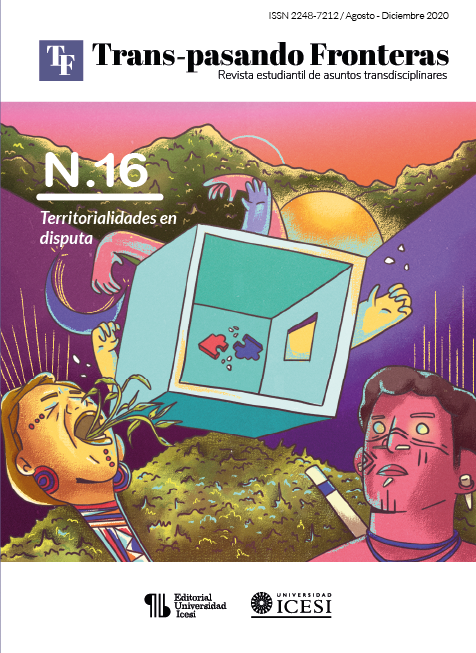Vigilando las fronteras mediante dispositivos tecnológicos de control de las personas, sus cuerpos y sus hábitos
Watching the borders through technological devices of control on people, their bodies and habits
DOI:
https://doi.org/10.18046/retf.i16.3928Keywords:
tecnologías de la disciplina, seguridad, afectos, derechos humanos, fronterasAbstract
Technology is part of the current control and security systems, penetrating the design of public policies, the foundations of our institutions and base of our values and routines. The present paper examines ethical consequences of technological control and surveillance of borders, that is, the way in which technologies discipline, model behaviours and regulate social rights. Therefore, it is extremely relevant that global citizens be aware of interference of those technologies, exerting power, control and supervision on people with and without legal citizenship status in the borders of the destination countries. In conclusion, this work argues that cross-border control and surveillance devices, although necessary, should guarantee the well-being and respect of human rights.
Downloads
References
Agger, Ben (2003). The virtual self: A contemporary sociology. London: Blackwell.
Ahmed, Sara (2004). Affective Economies. Social Text 79, 22(2): 117-139.
Ahmed, Sara (2010). The Promise of Happiness. Durham and London: Duke University Press.
Ajunwa, Ifeoma, Kate Crawford, y Jason Schultz (2017). Limitless Worker Surveillance. California Law Review 105(3): 734–76.
Akrich, Madeleine (2006). La description des objects techniques. En M. Akrich, Michel Callon y Bruno Latour Sociologie de la traduction: Textes fondateurs. Paris: Presses de l’École des Mines de Paris.
Beck, Ulrich (2008). La sociedad del riesgo: Hacia una nueva modernidad. Barcelona: Paidós.
Bijker, Wiebe E., Thomas P. Hughes, y Trevor J. Pinch (Eds.). (1987). The Social Construction of Technological Systems: New Directions in the Sociology and History of Technology. Cambridge: MIT Press.
Blázquez Graf, Norma, y Javier Flores (2005). Ciencia, Tecnología y Género en Iberoamérica. México: Universidad Autónoma de México.
Bloom, Mia (2011). Bombshell: Women and Terrorists. London: Hurst.
Brown, Wendy (2015). Estados amurallados, soberanía en declive. Barcelona: Herder.
Castles, Stephen, y Mark J. Miller (1993). The age of migration: International population movements in the modern world. Michigan University: Macmillan.
Crawford, Kate (2019) Artificial Intelligence’s White Guy Problem. The New York Time, 25 Junio, <https://www.nytimes.com/2016/06/26/opinion/sunday/artificial-intelligences-white-guy-problem.html> [Consulta: 13 enero 2020]
Chun, Wendy H.K. (2006). Control and Freedom. Power and paranoia in the age of fiber optics. Cambridge M. A.: MIT Press.
Cohn, Carol (ed.) (2015). Las mujeres y las guerras. Barcelona: Bellaterra
Cooke, Philip, y Loet Leydesdorff (2006). Regional development in the knowledge-based economy: The construction of advantage. The journal of technology Transfer 31: 5–15.
Dean, Jodi (2007). Feminism, Communicative Capitalism, and the Inadequacies of Radical Democracy. En Dahlberg Lincoln y Eugenia Siapera Radical Democracy and the Internet. London: Palgrave Macmillan.
Ditton, Jason (2000). Crimen and the city. The British Journal of Criminology 40(4): 692–709.
Enloe, Cynthia (1989). Bananas, Beaches, Bases: Making Feminist Sense of International Politics. London: Pandora Press
Elster, Jon (2005). El cemento de la Sociedad. Las paradojas del orden social. Barcelona: Gedisa.
Foucault, Michel (2002 [1975]). Vigilar y Castigar. Nacimiento de la prisión. Buenos Aires: Siglo XXI.
FRONTEX (2015). Best Practice Operational Guidelines for Automated Border Control (ABC) Systems. Warsaw: FRONTEX.
Goldsmith, Stephen, y Susan Crawford (2014). The Responsive City: Engaging Communities Through Data-Smart Governance. Chicago: Jossey-Bass, John Wiley & Sons.
Grabitz, Eberhard (1992). Border Controls. En Rudolf Bernhardt Encyclopedia of Public International Law. Amsterdam: North-Holland.
Haraway, Donna (1988). Situated Knowledges: The Science Question in Feminism and the Privilege of Partial Perspective. Feminist Studies 14(3): 575-599.
Harding, Sandra (2004). The Feminist Standpoint Theory Reader: Intellectual and Political Controversies. London: Routledge.
Hughes, Thomas P. (1987). The Evolution of Large Technological Systems. En Wiebe E. Bijker, Thomas P. Hughes y Trevor J. Pinch (ed). The Social Construction of Technical Systems: New Directions in the Sociology and History of Technology. Cambridge, MA: MIT Press.
Institute for Economics & Peace (2018). Global Terrorism Index 2018. Measuring the impact of terrorism. Sidney: Institute for Economics & Peace. Disponible en: http://visionofhumanity.org/reports.
Jeffreys, Sheila (2005). Beauty and Misogyny: Harmful Cultural Practices in the West. London: Routledge.
Lessig, Lawrence (1999). Code Version: And Other Laws of Cyberspace. New York: Basic Books.
Levmore, Saul, y Martha C. Nussbaum (2010). The Offensive Internet. Privacy, Speech, and Reputation. Cambridge: Harvard University Press.
Livingstone, Sonia, Mariya Stoilova, y Anthony Kelly (2016). Cyberbullying: incidence, trends and consequences. En UNITED NATIONS OFFICE Ending the Torment: Tackling Bullying from the Schoolyard to Cyberspace. New York: United Nations Office of the Special Representative of the Secretary-General on Violence against Children.
Lunt, Peter, y Sonia Livingstone (2012). Media regulation: governance and the interests of citizens and consumers. London: SAGE.
Lyon, David (1994). Electronic Eye: The Rise of Surveillance Society. Oxford: Polity Press.
Meszaros, Julia (2018). Race, space, and agency in the international introduction industry: how American men perceive women’s agency in Colombia, Ukraine and the Philippines. Gender, Place & Culture 25:2: 268-287.
Nussbaum, Martha (2007). Las fronteras de la justicia: consideraciones sobre la exclusión. Barcelona: Paidós.
Oroza, Rebeca, y Yoannis Puente Márquez (2017). Migración y comunicación: su relación en el actual mundo globalizado. CEDEM/Novedades en Población 25: 10-16.
Ponzanesi, Sandra (Ed.) (2014). Gender, Globalization, and Violence Postcolonial Conflict Zones. New York: Routledge
Rodier, Claire (2010). Frontex, l'agence tout risqué. Plein droit 4(87): 8-11.
Sassen, Saskia (2007). Una sociología de la globalización. Buenos Aires y Madrid: Katz Barpal Editores.
Sassen, Saskia (2015). Expulsiones: brutalidad y complejidad en la economía global. Buenos Aires y Madrid: Katz Barpal Editores.
Thakor, Mitali, y danah boyd (2013). Networked trafficking: reflections on technology and the anti-trafficking movement. Dialect anthropology 37: 277-290.
Urry, John (2007). Mobilities. Cambridge: Polity Press.
Weiss, Linda (2014). America Inc.? Innovation and Enterprise in the National Security State. Cornell: Cornell University.
Downloads
Published
Issue
Section
License
Trans-pasando Fronteras provides immediate open access to its content on the principle that making research freely available to the public supports a greater global exchange of knowledge.
© Authors hold copyright and publishing rights without restrictions but in accordance with the CC license.
All the material in this publication can be reproduced as long as reference is made to title, author and institutional source.







